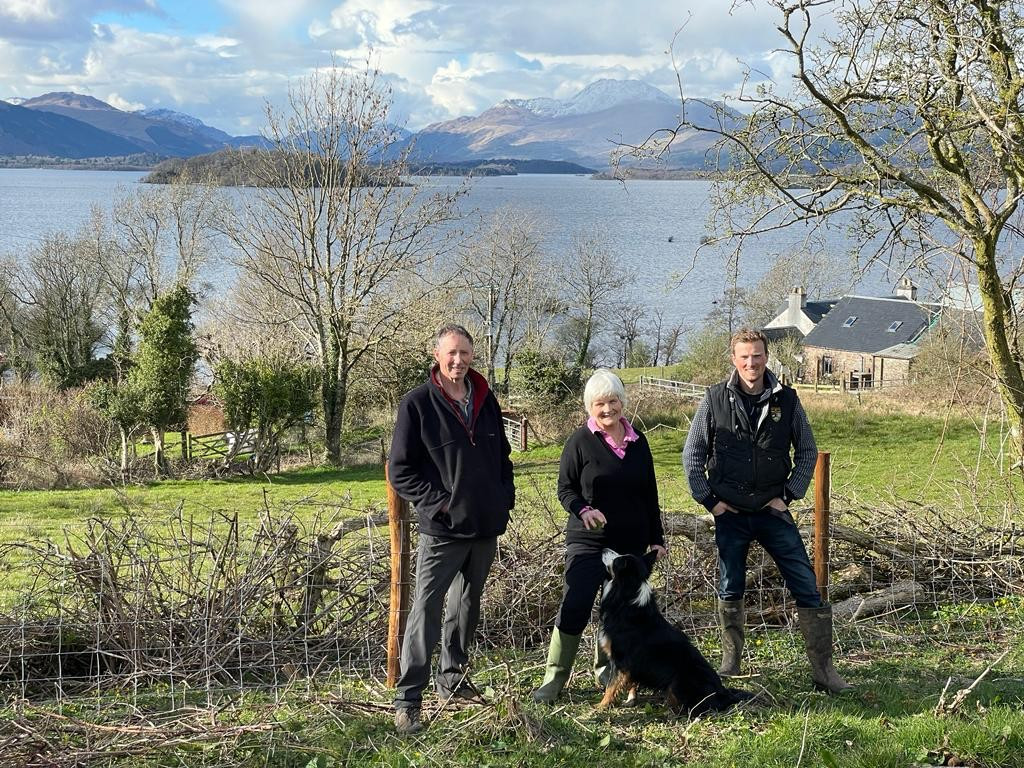News
AF Changemaker: view from the shore
28 February 2024
"I’m Freda Scott-Park from Portnellan Farm, a diversified 230-acre organic beef farm on the banks of Loch Lomond with 40 suckler cows."
"When I married into the farm in 1983, there were nearly 100 milking cows. In 2000, my father-in-law (who was interested in adverse effects of chemicals on health) looked at going organic if there was a commercial advantage. Personally I thought we shouldn't be using fertilisers or weedkillers on the shores of the loch and as a vet, I've never approved of administering antibiotics unnecessarily to animals, so 'going organic' was supported by my husband David and me. However, we had to reduce cow numbers to 70, with similar overheads.
"2010 saw the biggest change when we stopped milking altogether. Despite organic milk premiums, high organic feed costs meant we couldn’t turn a profit and our son, Chris, did not want to milk cows 24/7, although he did want to be a 3rd gen farmer.
"We converted to pasture-fed suckler beef using Simmentals to transfer from Ayrshire and Friesian genetics to Aberdeen Angus. Simmentals brought in a bigger carcass conformation, while being gentle to handle and very milky so calves did extremely well. Now we're using Shorthorn, Belted Galloway and Highland semen as well.
"We are a spring-calving herd and used to calve indoors in March but had problems with scuffed knees and navel/joint ill. We changed our health and welfare plan to calve outside in April (always challenging depending on the weather and grass growth) but we've reduced health issues and consequentially, antibiotic use.
"However, 40 suckler cows still doesn't provide enough income for two families, even selling stores, finished cattle and a small amount of beef from the freezer, so we looked at ways to diversify and become more sustainable, benefitting from our stunning location on Loch Lomond.
"We renovated the boat moorings in our bay and started to offer them to boat owners to use from April to October. The moorings now provide a third of our income and we have a lovely community of boat owners. Chris also runs his own business offering bespoke speedboat tours and water sports.
"The dairyman's house needed substantial renovation (£130,000) so we converted it into a warm, well-insulated 3-bedroom house offering four-star self-catering with spectacular views. At the same time, we installed a 200 kW biomass boiler, heating all three houses on the farm through a district heating system and delivering some income through the Renewable Heat Incentive (RHI).
"The Loch Lomond and Trossachs National Park asked us to look at glamping and gave us planning permission for eight tents near the loch shore. However, when we considered potentially having 40 extra people on the farm it did not fit with our ethos to maintain the farm's high nature value, so we decided not to go ahead. We put up a single 'test' tent near the farm and built the kitchen, toilet and shower facilities in the old dairy building and ran it for 6 years - a very popular destination it was too, especially around the pandemic lockdowns. When the second tent lost its waterproof integrity, we decided to develop the plans we've had for some time to develop some 'treehouses' or houses on raised platforms in the trees: ultra special, petite and well insulated."
"When purchasing big items for the holiday cottage, I contacted AF and said “Help! I need a range cooker, a fridge freezer, cutlery and crockery in quantity. Also, please - commercial freezers." and AF couldn't have been more helpful. It was great to have a go-to person at the end of the phone to give advice. Robert George has been fantastic with our telephone and broadband services. We’re two miles off the main road but with fibre we’ve now gone from 2 Mbps to up to 100 Mbps, which has revolutionised life.
"Diversification is now making us more money than farming and food production, which seems quite wrong to me, and it's added a complexity to our lives. We're more secure financially and we've chosen to have an AF Charge Card and a Fuel Card, which we use for all farm purchases - one point of contact for all credit services.
"We've just bought an electric car through AF, who made the process very simple. Greg Purling arranged a prompt quote, with substantial extra discounts, and he helped to arrange hire purchase finance. We are now working with Radius Chargepoint, AF's new partner for EV car charging."
"We're interested in expanding our green energy options increasing our solar panels. Turbines are not welcome in the National Park. AF will be the first place we'll start as we value their advice. Since watching the AF Webinar on HVO diesel I've been talking with David and Chris about greener options for our tractor fleet - tiny in comparison to some farms but we should still try to improve our carbon footprint.
"We pride ourselves on our abundance of wildlife and plant diversity - the trees are loaded with mosses and lichens and the range of fungi indicate a healthy mycorrizhal network below the soil. We need to plant more trees to mitigate our flooding issues. But before we do things, we ask can we afford it? Will it make a substantial difference? Will it benefit the farm, environment and ourselves? AF have helped us grow 'organically' and we're busier than ever - quite challenge with our small team of three but that's where AF's expertise saves us time and money."
We have lots of other ideas: tree planting to mitigate our flood issues. But we must think can we afford it? Will it make a substantial difference? Will it benefit the farm, environment and ourselves? AF have helped us grow 'organically' and we're busier than ever - quite challenging with our small team of three but that's where AF's expertise saves us time and money."